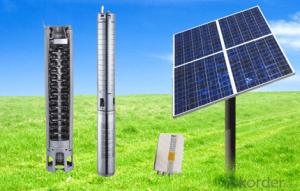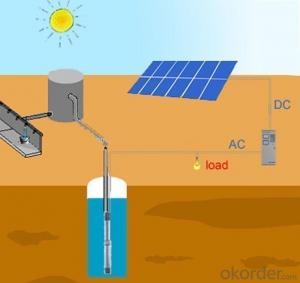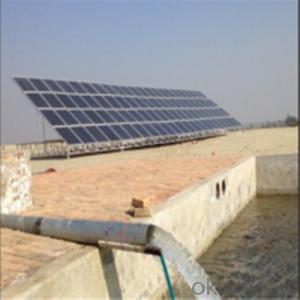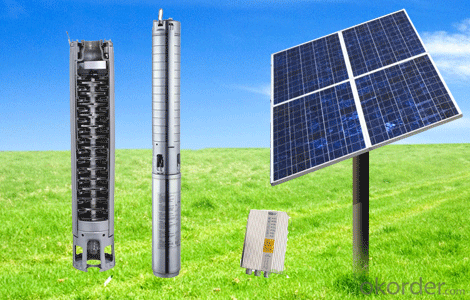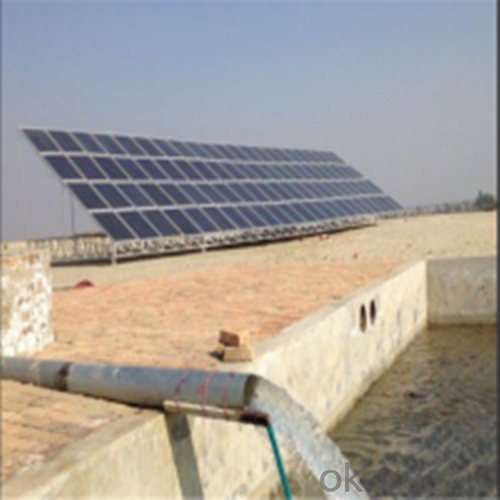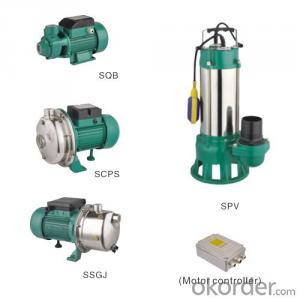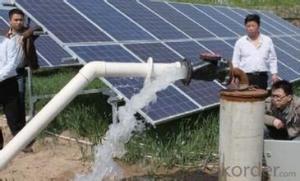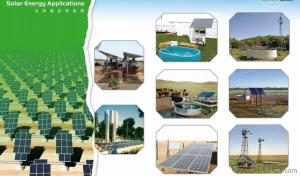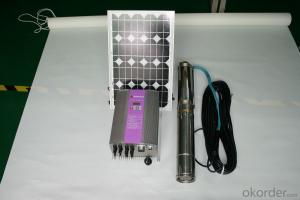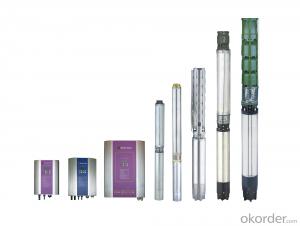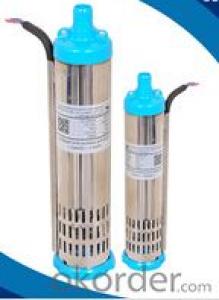Solar Pump for Fountain Controller Solar Irrigation Pump
- Loading Port:
- Shanghai
- Payment Terms:
- TT OR LC
- Min Order Qty:
- 1 set
- Supply Capability:
- 1000 set/month
OKorder Service Pledge
OKorder Financial Service
You Might Also Like
Solar Pump Controller Solar Irrigation Pump
DC solar water pumping system consists of the motor, pump, controller, solar array and some other accessories, such as water level sensor, float switch, etc. Considered that storing water is more efficient than storing electricity, the system is designed to directly drive the pump without battery which can reduce the construction and operating cost and routine maintenance effectively.The PV array consists of multiple solar panels connected in series/parallel, which can supply the whole system as power source by converting the absorbed solar radiation energy to the electrical energy. The pump driven by a brushless DC permanent magnet motor draws water from deep-well or river. The pumped water is then fed into reservoir or water tank, or connected to the irrigation system or fountain system directly.
Advanced Technology
Applications Innovation
The efficiency of DC brushless permanent magnet motor has been increased up to 25% in comparison with traditional asynchronous motor.
Technology Innovation
Stator and rotor are sealed by environment friendly casting resin.Motor insulation resistance can be hold higher than 300MΩfor more than 10 years, which consumedly increased the security and reliability of the submersible motor.
Structure Innovation
Casting resign technology processed stator and rotor as well as the water lubricated bearing make the submersible pump environment friendly.
Feature
High Efficiency & High Reliability
DC Brushless Permanent Magnet Motor
Minimum Maintenance, long Service Life
Environment Friendly Materials, Lubricated Without Oil
Application
Village or Family Water Supply
Animal Drinking Water & Livestock Watering
Garden/Courtyard Irrigation
Swimming Pool
Water Supply for Bivouac or Camping Car
Water Supply for Remote Area
Automatic Control
Operate Automatically, No Need Watching
Maximum Power Point Tracking (MPPT)
Dry-run Protection
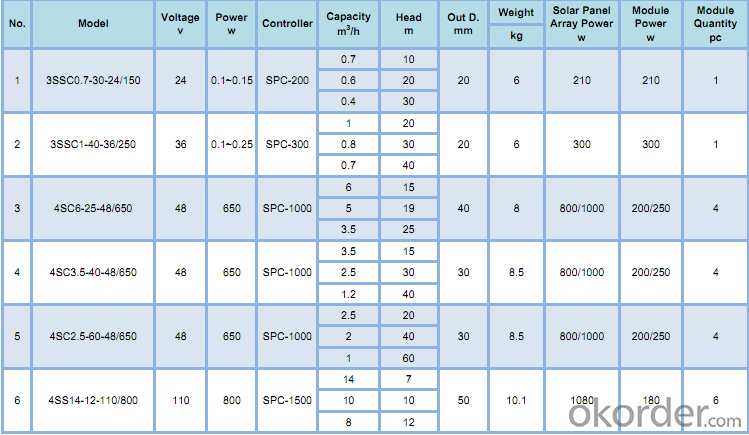
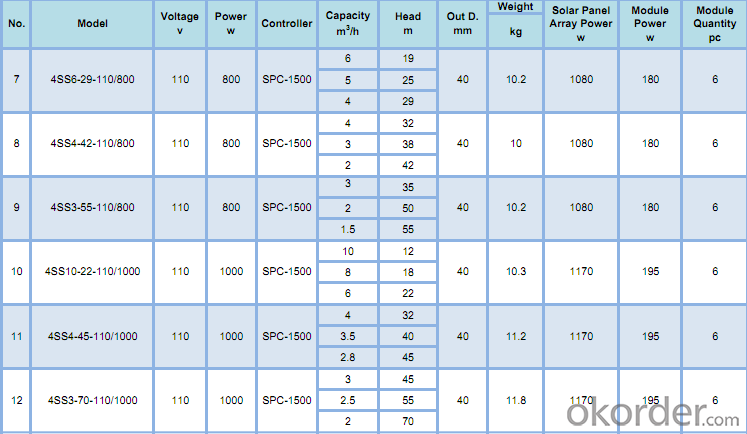
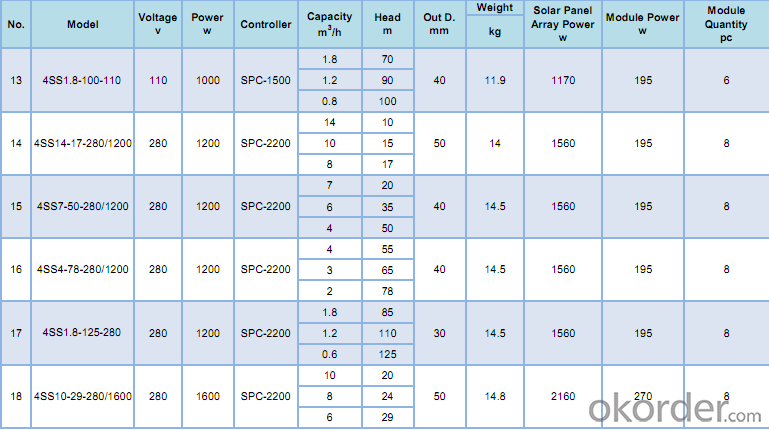
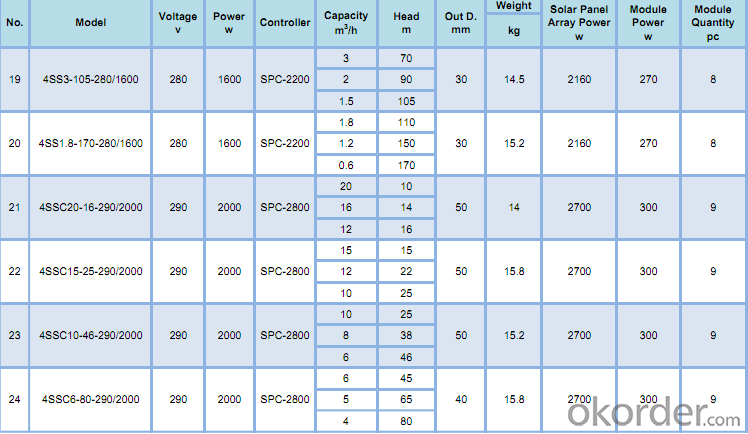
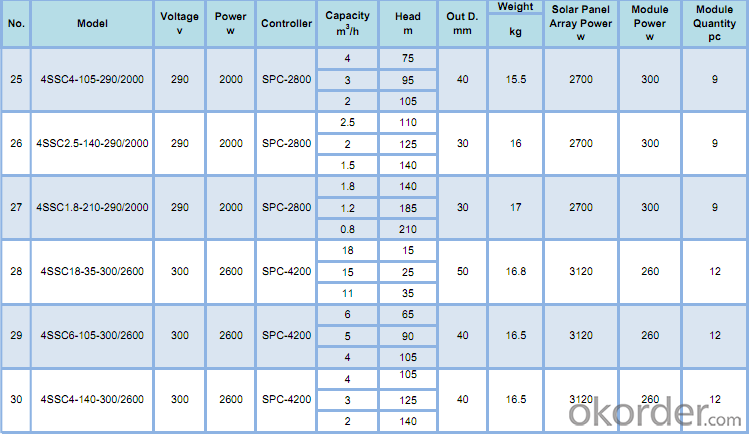
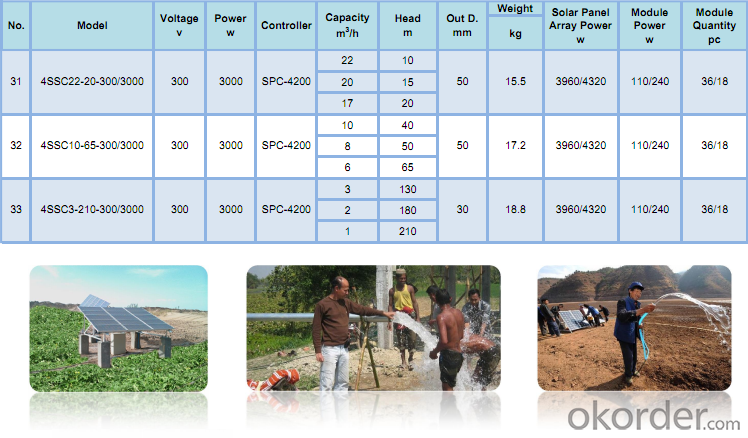
- Q: Are solar pumps suitable for both residential and commercial use?
- Solar pumps are suitable for both residential and commercial use, offering a great deal of versatility. They can be utilized for irrigation, water supply, and other fluid management tasks. Both individuals and businesses can benefit from solar pumps as they provide several advantages. The first advantage is their environmental friendliness. By using clean and renewable energy from the sun, solar pumps help reduce carbon emissions and decrease reliance on non-renewable energy sources. This makes them an excellent choice for those who want to adopt sustainable practices. Furthermore, solar pumps can lead to significant long-term cost savings. Although the initial investment may be higher compared to traditional pumps, solar pumps have minimal operating and maintenance expenses since they do not require fuel or electricity to function. This can result in substantial utility bill savings for both residential and commercial users. Moreover, solar pumps are highly reliable and efficient. They can operate independently of the electrical grid and can be installed in remote areas where electricity access may be limited or expensive. Additionally, solar pumps have low maintenance requirements, with many models designed to work for several years without major servicing or component replacements. Lastly, solar pumps offer scalability, meaning they can be customized to meet the specific needs of both residential and commercial users. Whether it's a small residential garden or a large-scale agricultural or industrial operation, solar pumps can be sized and designed accordingly. In conclusion, solar pumps are a viable choice for both residential and commercial use. Their environmental benefits, cost-effectiveness, reliability, and scalability make them an appealing option for individuals and businesses seeking to harness the power of the sun for their pumping requirements.
- Q: Can a solar pump be used to create a water fountain?
- Yes, a solar pump can definitely be used to create a water fountain. Solar pumps are designed to operate with solar energy, which means they can be placed in areas without access to electricity. By connecting the solar pump to a water source, it can circulate and push the water through a fountain nozzle, creating a beautiful water fountain. This makes solar pumps a sustainable and eco-friendly option for creating water features.
- Q: How long does it take to recoup the investment in a solar pump system?
- The time it takes to recoup the investment in a solar pump system can vary depending on several factors. These factors include the upfront cost of the system, the amount of energy savings achieved, and any applicable incentives or subsidies. Typically, a solar pump system can pay for itself within a few years to a decade. This is primarily due to the significant reduction in energy costs that come with using solar power. By harnessing the energy of the sun, solar pumps can significantly reduce or eliminate the need for electricity or fuel to power the pump. To determine the specific payback period for a solar pump system, you would need to consider the initial investment cost and compare it to the energy savings achieved. It is important to factor in the cost of maintenance and any additional expenses associated with the installation and operation of the system. In some cases, government incentives or subsidies can further shorten the payback period. These incentives may include tax credits, grants, or feed-in tariffs, which can provide financial support for the installation and operation of solar pump systems. Ultimately, the payback period for a solar pump system will depend on the specific circumstances and location. However, with the rising costs of electricity and the increasing affordability of solar technology, investing in a solar pump system can be a financially beneficial decision in the long run.
- Q: Can a solar pump be used for water supply in off-grid villages?
- Yes, a solar pump can indeed be used for water supply in off-grid villages. Solar pumps are an excellent solution for areas that lack access to electricity or have unreliable power supply. They operate using solar energy, which is abundant in most off-grid locations. These pumps use photovoltaic panels to generate electricity, which powers the pump to draw water from a source such as a well, river, or lake. Solar pumps have several advantages for off-grid villages. Firstly, they are environmentally friendly as they do not produce greenhouse gas emissions or rely on fossil fuels. They also have lower maintenance costs compared to traditional gasoline or diesel pumps, as they have fewer moving parts and require less frequent servicing. Additionally, solar pumps can be easily installed and operated without the need for extensive infrastructure or technical expertise. By utilizing solar pumps, off-grid villages can have a sustainable and reliable water supply. They can be used to provide clean drinking water, irrigation for crops, or water for livestock. This in turn can enhance the overall quality of life for villagers, improve agricultural productivity, and contribute to economic development. However, it is important to consider the specific needs and conditions of each village before implementing a solar pump system. Factors such as water demand, available sunlight, and water source accessibility must be assessed to ensure the system is designed and sized appropriately. Furthermore, proper maintenance and regular monitoring are crucial for the long-term success and sustainability of the water supply system. In conclusion, a solar pump is a viable and beneficial option for providing water supply in off-grid villages. It offers a sustainable, cost-effective, and environmentally friendly solution that can significantly improve the lives of people in these communities.
- Q: Can a solar pump be used in conjunction with a water storage system?
- Yes, a solar pump can be used in conjunction with a water storage system. The solar pump can be used to draw water from a source, such as a well or a reservoir, and then pump it into the water storage system for later use. This allows for the utilization of renewable energy to power the pump and store water for various purposes, such as irrigation or household needs.
- Q: Can solar pumps be used in saltwater or brackish water environments?
- Yes, solar pumps can be used in saltwater or brackish water environments. However, it is important to use corrosion-resistant materials and proper maintenance to prevent damage from the corrosive nature of saltwater.
- Q: Can a solar pump be remotely monitored or controlled?
- A solar pump can indeed be monitored and controlled from a remote location. Thanks to technological advancements, many solar pumps now come equipped with systems that allow for remote monitoring and control. These systems typically use wireless communication technologies like GSM, GPRS, or satellite communication to enable remote access to the pump's performance data and control functions. With remote monitoring, users can keep track of the pump's operation, performance, and energy production in real-time from a central location. This information includes data on water flow rates, power output, system efficiency, and battery charge levels. It helps identify any issues or inefficiencies promptly, allowing for timely maintenance or adjustments to optimize the pump's performance. Moreover, remote control capabilities enable users to remotely operate and control the pump's functions. This includes actions like starting or stopping the pump, adjusting the speed or flow rate, changing the operational mode, or even toggling the pump's power supply on or off. These control features provide convenience and flexibility, especially in situations where physically accessing the pump may be challenging or time-consuming. In summary, remote monitoring and control of solar pumps offer significant advantages in terms of efficiency, convenience, and cost savings. It allows for proactive maintenance, efficient energy management, and the ability to promptly respond to any issues or changes in operating conditions.
- Q: How does a solar pump handle water with high levels of chlorine?
- A solar pump does not directly handle water with high levels of chlorine. Its main function is to pump water from a source, such as a well or a reservoir, and deliver it to a desired location. If the water being pumped has high levels of chlorine, it is advisable to treat or filter the water before it reaches the solar pump to ensure the longevity and efficiency of the pump.
- Q: How long do solar pumps last?
- Solar pumps can last anywhere from 10 to 25 years, depending on the quality of the equipment and how well they are maintained.
- Q: Can a solar pump be used for water supply in remote farms or ranches?
- Yes, a solar pump can be used for water supply in remote farms or ranches. Solar pumps are an efficient and sustainable solution for providing water in areas where access to electricity is limited or non-existent. They harness solar energy to power the pump, eliminating the need for grid electricity or fuel-powered generators. This makes them an ideal choice for remote locations, allowing farmers and ranchers to have a reliable and cost-effective water supply for their agricultural activities.
Send your message to us
Solar Pump for Fountain Controller Solar Irrigation Pump
- Loading Port:
- Shanghai
- Payment Terms:
- TT OR LC
- Min Order Qty:
- 1 set
- Supply Capability:
- 1000 set/month
OKorder Service Pledge
OKorder Financial Service
Similar products
Hot products
Hot Searches
Related keywords
